 November 5-December 10, 2019
November 5-December 10, 2019
Intro To Maple Syrup Production for Profit:
Tap into the Syrup Possibilities on Your Farm
6-week course includes 7 pm-8:30 pm Tuesday webinars
Course taught by Cornell NNY Maple Specialist and Uihlein Maple Research Forest Director Adam Wild. Assess the potential for maple sugaring on your land, alternative trees (including birch and black walnut) for production, understand costs and benefits of different systems for collection, processing, and packaging. Bulk of the course happens on your own time with discussions, readings and assignments in Teachable online course platform with weekly webinars. Learn more: https://smallfarmcourses.com/p/bf-152-intro-to-maple-syrup-production
NNY Tile Research: Rain & Drains, Loss & Gains
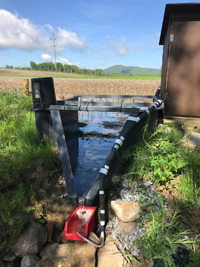
Chazy, N.Y.: October 8, 2019. Field-level research funded by the farmer-driven Northern New York Agricultural Development Program is responding to the need to better understand how tile drainage influences nutrient efficiency, water quality, crop production, and farm economics.
Results from the most recent data collection from tiles installed at the Lake Alice Wildlife Management Area in Chazy, N.Y., and on a working farm in Clinton County are adding to a database designed to quantify surface and underground movement of nutrients beyond field boundaries. The work has also begun identifying opportunities to develop best practices for nutrient conservation to support both crop production and environmental stewardship.
Project leader Laura Klaiber, Nutrient Management Researcher at W.H. Miner Agricultural Research Institute, Chazy, N.Y., explains, “Although tile drainage naturally exports some level of nutrients, until the Northern New York Agricultural Development Program established these research trials there had been very few in-depth year-round studies in this region designed to investigate how the use of tile drainage directly impacts runoff and nutrient cycling in agricultural fields.”
For some farms, the use of tile drainage significantly benefits crop yield, yield consistency, and crop quality; allows farmers to access fields sooner for spring planting and later in the fall for harvesting and cover crop planting; and can reduce soil erosion.
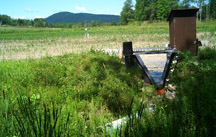
In the on-farm study, corn yields were 30 percent greater from the tile-drained field than an adjacent undrained field. Klaiber says the improved drainage may have created better conditions for root development and increased nitrogen mineralization rates in the soil, resulting in greater nitrogen availability for crop growth.
Overall, phosphorus losses across all trial plots were below thresholds for freshwater eutrophication.
However, Klaiber points out, “The data indicates that there is a pool of phosphorus at the soil surface which could pose a risk for higher losses during a year with more precipitation, particularly in the undrained field where there is a greater risk of surface runoff and erosion. These northern New York trials suggest that continued development, and use, of best management practices, such as cover cropping, would support efficient nutrient uptake and minimize nutrient loss, particularly in the spring season.”
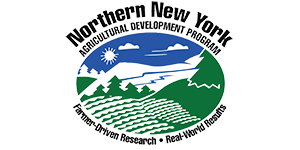 Separate projects funded by the Northern New York Agricultural Development Program are assisting farmers with whole farm nutrient balancing and refining precision manure and fertilizer application guidelines that help reduce the amount of phosphorus available for runoff, while supporting successful crop development and potential cost savings.
Separate projects funded by the Northern New York Agricultural Development Program are assisting farmers with whole farm nutrient balancing and refining precision manure and fertilizer application guidelines that help reduce the amount of phosphorus available for runoff, while supporting successful crop development and potential cost savings.
The complexities of weather interaction with different crops, cropping systems, field management, soil types, soil fertility, and topography are in the wings for next-step research and evaluation.
“As we all know, weather events can be highly variable and extreme, so multi-year data collection that increases our knowledge base is the foundation for developing the best management recommendations to positively impact nutrient use, farm economics, and environmental stewardship,” Klaiber points out.
The results of the Northern New York Agricultural Development Program-funded tile drainage projects are posted at https://nnyagdev.org/index.php/field-crops/drainage-management/, and have been presented at regional Crop Congresses; at watershed events in New York State; to the Vermont Agency of Agriculture, Food and Markets Tile Drainage Advisory Group; and to the House Agriculture and Forestry Commission, Montpelier, VT.
Funding for the Northern New York Agricultural Development Program is supported by the New York State Legislature and administered by the New York State Department of Agriculture and Markets.
NNYADP Apple Research Supports Recovery Fire Blight Epidemic
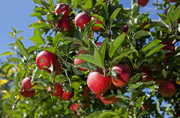
Peru, N.Y.; September 12, 2019. Apple research funded by the farmer-driven Northern New York Agricultural Development Program and conducted by Srdjan G. Acimovic, Ph.D., of the Hudson Valley Research Laboratory, has helped regional growers recover from the 2016 epidemic of fire blight in the Champlain Valley region, and the project data has informed growers statewide.
“The impact of this research is depicted in the fact that growers did not have any new fire blight epidemics in 2017 or 2018 in the same or nearby orchards nor any new tree or fruit losses,” said Acimovic, a Senior Extension Associate in the Cornell University School of Integrative Plant Science Plant Pathology and Plant-Microbe Biology Section, based at the Hudson Valley Research Laboratory, Highland, N.Y.
Fire blight is a bacterial disease that infects apple flowers, shoots and, sometimes, entire trees, with the potential to cause severe economic damage to orchard businesses.
Cornell researchers estimate the damage, including yield loss and tree death, from a fire blight epidemic in the northern NY apple orchards in 2016 at more than $14 million.
Seven NNY apple farms and one Hudson Valley apple grower have worked with Acimovic as his research team refines the development of fire blight detection and prediction tools and associated management recommendations.
The detection of the fire blight pathogen in rootstocks in the NNY orchards helped growers identify infected trees for removal, and, in some cases, which orchard blocks needed replanting after the 2016 epidemic.
“A year ago, in September 2018, when we rated trees in the NNY apple orchards for tree death caused by fire blight, we detected very little change in six of the seven farms and only slightly more dead trees on one farm,” Acimovic noted.
On-farm monitoring, location-specific fire blight prediction interpretation, and e-mail alerts with management recommendations have kept growers ahead of the disease curve, encouraged precision application, and, therefore, reduced spraying.
The NNY orchard owners allowed Acimovic to use their data to support alerts to growers statewide.
However, Acimovic advises caution as the fire blight pathogen can linger at low levels beyond the detection of current tools. He has worked with NNY growers in 2019 to enhance the sensitivity of the detection equipment.
The current precision apple orchard research funded by the Northern New York Agricultural Development Program is also developing a more in-depth understanding of the strains of fire blight bacterium to learn their virulence and ability to infect orchards not only in NNY, but anywhere in New York State.
“Characterizing the various strains of fire blight will inform us more about the susceptibility or resistance an orchard may have, and how well it might respond to treatment,” Acimovic said.
The NNYADP-funded apple research in 2019 is applying new apple disease prediction models to time and reduce spraying, measuring the efficacy of copper applications to manage fire blight, and analyzing the dynamics of the pathogen development in tree cankers over the two years of data collected in the NNY orchards.
Apple growers interested in more information on this research may contact Cornell Cooperative Extension Tree Fruit Specialist Michael Basedow at 518-410-6823. The Northern New York Agricultural Development Program website at www.nnyagdev.org includes a link to the Acimovic Lab disease management and modeling blog.
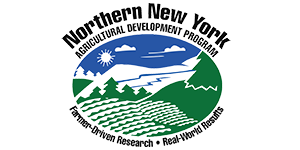 Funding for the Northern New York Agricultural Development Program is supported by the New York State Legislature and administered by the New York State Department of Agriculture and Markets.
Funding for the Northern New York Agricultural Development Program is supported by the New York State Legislature and administered by the New York State Department of Agriculture and Markets.
Click here for the complete NNYADP fire blight research report
NNYADP Apple Research: Use Hail Netting to Exclude Pests?
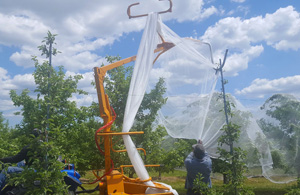
Plattsburgh, N.Y.; September 3, 2019. Real-time, regional in-orchard research funded by the farmer-driven Northern New York Agricultural Development Program (NNYADP) is helping apple growers quickly respond to pests with the latest management practices. It also provides insight into practices that may or may not work to protect the NNY apple crop conservatively valued at $57 million.
“Pest management is one of the largest investments fruit growers must make in terms of time, labor, and materials to produce marketable fruit and maintain healthy trees,” says project leader Michael Basedow, a tree fruit specialist with the Cornell Cooperative Extension Eastern NY Commercial Horticulture Program, Plattsburgh, NY.
With a grant from the NNYADP, Basedow provided weekly pest scouting data to help growers quickly respond to orchard pests with appropriate pest management tactics. He also initiated a project to evaluate whether exclusion netting used for protecting apples from hailstorm damage might also protect the fruit from orchard pests.
A series of hailstorms in 2017 damaged the NNY region’s apple crop. One grower reported up to more than 60 percent of his acres suffered damage. Basedow says, “Growers selling hail-damaged fruit for juice that would otherwise have sold at retail prices can see as much as a 98 percent decrease in the economic value of their crop.”
Basedow worked with commercial growers in Clinton and Essex counties who had installed hail netting. Trials in France and Quebec, Canada, had showed success in limiting damage by codling moth and other orchard pests, but the use of drape-style netting had not been well-evaluated under northern NY orchard conditions.
“We are constantly looking at ways to increase the use of integrated pest management (IPM) practices that allow us to produce a commercially viable crop while also making the best use of growers’ time, labor, and money. We wanted to see if the hail netting might be an effective practice to add to our apple growers’ IPM toolbox,” Basedow said.
The research provided weekly trap data on four key apple pests in northern NY: codling moth, Oriental fruit moth, obliquebanded leafroller, and apple maggot.
“Results from the trial showed that traps in the trees under the netting caught significantly fewer of the four key pests compared to the unnetted trees, however,” Basedow says, “the pest pressure levels in 2018 for three of the four key pests was such that the feasibility of using hail netting for pest exclusion is still uncertain. The netting may help reduce pest numbers enough to reduce the total number of orchard sprays needed for some pests, such as apple maggot, where spray decisions are based on well-established economic thresholds.”
Basedow adds that the sites with the most effective pest exclusion were those where the hail netting was tightly tied to the lower limbs and trunks of the apple trees. The orchard with the best control applied the netting to trees grown to a tall spindle training system with the netting secured tightly to the trunks.
This NNYADP project provided more than 450 orchard businesses in northern and eastern NY with the weekly pest scouting data during the 2018 growing season. A like number of growers and fruit specialists attended meetings that included mention of this hail netting pest exclusion research. The full project report is posted on the NNYADP website at www.nnyagdev.org.

Funding for the Northern New York Agricultural Development Program is supported by the New York State Legislature and administered by the New York State Department of Agriculture.
2020 NNYADP Grant Application Now Available
 The Northern New York Agricultural Development Program application for 2020 small grant funding is now available. The farmer-driven program funds research and technical assistance projects in support of the diverse agricultural industry serving the economy and communities in Clinton, Essex, Franklin, Jefferson, Lewis and St. Lawrence counties. The innovative research and project results accomplished here have not only helped enhance the sustainability and profitability of farms under the unique Northern New York growing conditions of the six-county region, but have had far-reaching value across New York State and beyond.
The Northern New York Agricultural Development Program application for 2020 small grant funding is now available. The farmer-driven program funds research and technical assistance projects in support of the diverse agricultural industry serving the economy and communities in Clinton, Essex, Franklin, Jefferson, Lewis and St. Lawrence counties. The innovative research and project results accomplished here have not only helped enhance the sustainability and profitability of farms under the unique Northern New York growing conditions of the six-county region, but have had far-reaching value across New York State and beyond.
Click here for the 2020 NNYADP application and budget form and research ideas.
Application deadline: October 29, 2019.
Funding for the Northern New York Agricultural Development Program is supported by the New York State Legislature and administered by the New York State Department of Agriculture and Markets.
- « Previous Page
- 1
- …
- 33
- 34
- 35
- 36
- 37
- …
- 97
- Next Page »